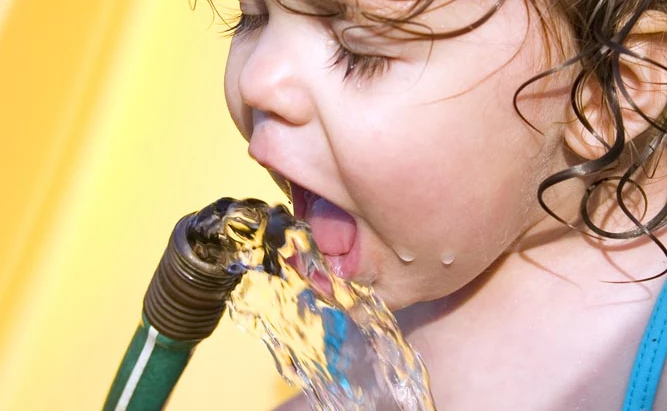Dehydration: Know the signs and how to prevent it.

May 27, 2024
As the days get warmer, it’s important to take extra care to stay hydrated and protect yourself and your family from dehydration, a very common heat-related illness.
Our bodies lose water through normal daily functions, such as sweating, tears, and urination and in some cases, illness causes excessive water loss through vomiting, diarrhea, and fever. For most healthy people, this water can be replaced by drinking fluids throughout the day regularly and by being even more mindful to do so when illness strikes. However, when the summer sets in, your body can work harder to keep itself cool by sweating more, causing extra loss of water and vital body salts such as sodium and potassium. Without proper hydration to replenish what is lost, dehydration can occur quickly .
Symptoms of dehydration include,
- Thirst
- Less-frequent urination
- Dry skin
- Fatigue
- Light-headedness
- Dizziness
- Confusion
- Dry mouth and mucous membranes
- Increased heart rate and breathing
In children, additional symptoms may include:
- Dry mouth and tongue
- No tears when crying
- No wet diapers for infants for several hours
- Sunken abdomen, eyes, or cheeks
- Listlessness
- Irritability
- Skin that does not flatten when pinched and released
Mild cases of dehydration can be treated at home by drinking fluids and restoring electrolytes and salt balance – ask your pharmacist about the children’s beverages and sports drinks they have available. More severe cases may need physician intervention and monitoring and may include IV fluids.
The best course of action is always prevention.
- Drink plenty of fluids throughout the day and even more when you are active outside working or playing.
- Consider keeping electrolyte drinks on hand to help restore your body’s balance on extra hot and active days.
- Take the necessary precautions when you are outside – wear sunscreen, a hat, and protective clothing for prolonged exposure to the sun. Learn more about sun safety here.
- Avoid planning outdoor activities during the heat prime-time, approximately 1:00 pm – 4:00 pm each day
Learn more about staying safe in the sun here. Have fun in the sun this summer, and stay hydrated!
For more information about dehydration and other heat-related illnesses, please visit these resources: Johns Hopkins Medicine and the Centers for Disease Control and Prevention.